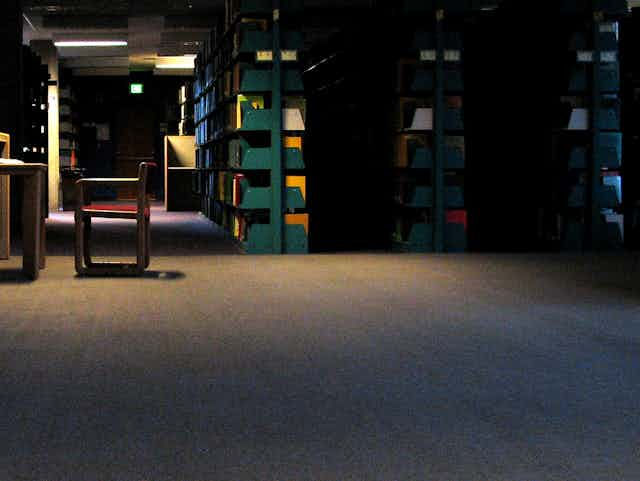Universities in this country are under increased pressure to share information about the activities of students and staff whether for immigration purposes, in relation to activism on campus or even in relation to academic research projects that might touch on issues to do with political violence.
Guidance to universities on how to handle “security sensitive” research was quietly published last October by Universities UK, which represents higher education leaders. Since then, universities have been trying to decide whether or not to follow what this document says. Researchers need to access information about terrorism in the course of their work, often including suspicious websites, but when they do, they risk falling under suspicion from the authorities.
When the government promulgates draconian anti-terror laws making it an offence to download, possess, share or post information online and the police lock up innocent students engaged in legitimate research, what should the response of the universities be?
In these circumstances should they protest at the unacceptable chilling effect that such legislation will inevitably have on independent research – research that might enable a better understanding of terrorism?
Or should they instead propose that researchers engaged in ‘security sensitive’ research should have their work monitored by university staff with a view to informing the police of academic activities?
Depressingly, some universities look set to opt for the latter. In the report published last October, ethicist Professor Tom Sorell of the University of Warwick, even suggested that the job of reporting back to the police about academic activities should fall to the university ethics officer. It is now apparently ethical for university staff to play the coppers’ nark and inform on their colleagues.
The officer will be tasked with requiring academics to declare that they might have security sensitive documents and instructing them to store them securely in a central university store. The ethics officer would then liaise as appropriate with the university security department and possibly the police.
The report suggests that should anyone resist or, possibly even mistakenly, neglect to add a document to the store then this “will cast more suspicion on a researcher”. Thus the ethics officer becomes the police officer at one remove.
The document never defines what it means by “security-sensitive” information. This is possibly because there is no such definition in anti-terrorism law. We might assume that we would know it when we see it, but the Terrorism Acts of 2000 and 2006 define offences in such a way that the content of the information is not always relevant. The 2000 Act, for example, makes it an offence to possess information “likely to be useful” to a person “committing or preparing and act of terrorism”. It is specifically noted that this includes photos and electronic information. So there is no easy way to tell what information is likely to be “security sensitive”, since it depends on the use to which it might be put. One is reminded of the key piece of evidence against nine Algerian suspects arrested in Glasgow in December 2002 - “a map marked with key locations in Edinburgh” which was later found to be the property of an Australian backpacker who had doodled on it. The Algerians were released without charge.
Perhaps the worst part of the guidance is when the author makes a specific claim that the recommended system does not “single out Muslims” because it will apply “whether that terrorism is Muslim-linked or not”. He uses the link with the ethics officer to undergird his argument that “the existence of a research ethics review process and the availability of safe storage for security-sensitive material will not stigmatise any specific groups.”
Yet elsewhere the author advises that universities should issue guidance for internet users that “can call attention to the risks of visiting and downloading from jihadist websites.” Everyone knows that the “threat” of terrorism does not come only from “jihadists” and so the imbalance will be clear to all. But few people who form their opinions on the threat posed by Islamist terrorism by listening to successive government ministers or the BBC will be aware that this type of terrorism makes up an extraordinarily small proportion of the terrorist threat across Europe. According to Europol - in data supplied to them by all 27 EU governments, the number of Islamist terrorist attacks never exceeded 0.7% of the total number of terrorist attacks in any year between 2006 and 2009.
Warning users not to download or “frivolously” share material from certain websites using university IT infrastructures could lead to a wider chilling effect. For those who think it is easy to distinguish between “Jihadist” sites and those merely critical of UK foreign policy, remember the example of Dr David Stevens of Nottingham University. He produced a publicly-funded report on the top 20 radical Islamic blogs after a secondment to the Home Office based, intelligence linked, Research Information and Communication Unit. But included in the top three on his list, reported the Guardian, were an atheist/leftist Lebanese-American Professor and a liberal Muslim Guardian contributor. If university academics can’t be relied upon to identify radical Islamic websites, it seems unlikely that University IT guidelines will do much beyond scaring some students from enquiring about the causes of terrorism at all.
Universities should consider very carefully before they get even closer to the police and intelligence services. The more they do so, the less space there will be for academics to carry out independent and rigorous research on political violence both here and abroad. Policies such as those recommended by Universities UK are genuine threats to academic freedom.

